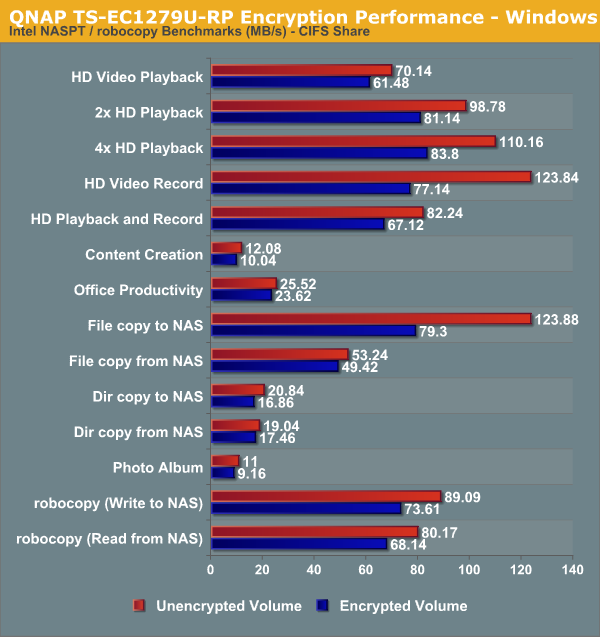QNAP's TS-EC1279U-RP 12-bay Flagship Rackmount NAS Review
by Ganesh T S on April 29, 2013 4:30 PM EST- Posted in
- Enterprise
- Storage
- NAS
- QNAP
Encryption Support Evaluation
Consumers looking for encryption capabilities can opt to encrypt a iSCSI share with TrueCrypt or some in-built encryption mechanism in the host OS. However, if requirements dictate that the data must be shared across multiple users / computers, relying on encryption in the NAS is the best way to move forward. Most NAS vendors use the industry-standard 256-bit AES encryption algorithm. One approach is to encrypt only a particular shared folder while the other approach is to encrypt the full volume. Some NAS vendors have support for both approaches in their firmware, but QNAP only opts for the latter. Details of the QNAP's encryption key management mechanism and other caveats are available here.
On the hardware side, encryption support can be in the form of specialized hardware blocks in the SoC (common in ARM / PowerPC based NAS units). In x86-based systems, encryption support is dependent on whether the AES-NI instruction is available on the host CPU (not considering units based on the Intel Berryville platform). Current generation Atom CPUs (and even the Core i3 CPUs) don't support AES-NI. Fortunately, the Xeon E3-1225 used by QNAP in the TS-EC1279U-RP supports AES-NI. The impact of enabling encryption should be minimal.
We created an encrypted volume and reran our Intel NASPT / robocopy benchmarks on a CIFS share. The results are presented in the graph below (with the unencrypted volume numbers for comparison purposes).

As expected, encryption does carry a performance hit, but the impact is not very extensive. Depending on the type of workload, the penalty varies between 7.2% and 38%. We will be shortly carrying out a review of an Atom-based NAS where we will see that the penalty is much bigger.










23 Comments
View All Comments
Jeff7181 - Tuesday, April 30, 2013 - link
EMC, Hitachi and NetApp provide enterprise class NAS and SAN arrays. This, nor any, QNAP product is anywhere near that level.Walkeer - Thursday, May 9, 2013 - link
agreed, plus NAS is not really enterprise anyway since these is SANdavegraham - Tuesday, April 30, 2013 - link
Ganesh,having worked in the storage industry (and now working for an enterprise and carrier networking company doing data center architecture and design) QNAP, Drobo, et al. aren't names that carry any weight for enterprise-class storage. The systems I deal with (for example, EMC Symmetrix VMAX 40K) are considered "enterprise class" storage systems (99.999% uptime, SSD caching and tiering, finely tuned atomic memory and storage access, multiple active processing storage engines/directors, fibre channel/FCoE/iSCSI front ends, extensive API command/control sets, replication [local & remote], snapshotting/cloning, etc.). As Jeff7181 notes below, these stand alone in a class by themselves.
cheers,
D
Walkeer - Thursday, May 9, 2013 - link
agreed, this is a SOHO toy...jaziniho - Wednesday, May 1, 2013 - link
Unless this comes in a model with dual controllers (not just dual PSUs), then it's squarely in the SMB rather than enterprise space.Support for SAS as well as SATA disks would also be high on list of potential requirements for enterprise. With RAID rebuild times on large drives so long, you need disks with decent reliability to give you more confidence in making it through the rebuild.
aloginame - Saturday, May 11, 2013 - link
I agree with the fact that this QNAP is not really a "Enterprise" or "High-End" solution for NAS, however, I have to disagree when it is being compared to something like EMC Symmetrix VMAX 40K, for those are really SAN solutions and not NAS.golemite - Monday, April 29, 2013 - link
Hi Ganesh, any chance of getting reviews of lower end rackmount NAS systems like the Synology RS812/812+?ganeshts - Wednesday, May 1, 2013 - link
We have the Synology RS10613sx+ in the pipeline, but it costs approx. twice that of the TS-EC1279U-RP and caters to users who require more performance / features.mmayrand - Tuesday, April 30, 2013 - link
So, you spend $3500 for box plus 12 SSD (not free) and you get the 1/3 of the effective bandwidth of a single SSD plugged in a $300 PC. Is there a point to these NAS boxes?davegraham - Tuesday, April 30, 2013 - link
Mmayrand,the concept behind a NAS box is shareable storage across N-number of users in a SoHo or SMB environment. at that point, it makes more sense to have a common pool of storage that can be "protected" (remember, RAID is NOT backup) and utilized more efficiently, than a scattered or siloed collection of independent disk in a laptop or desktop.
it also is a basic requirement for most virtualization (the concept of shared storage) solutions to maintain high availability and portability for virtual machines within a cluster. As a standalone box, you're right, you can hit better performance #'s because you're just straddling a PCIe bus vs. ethernet. however, change the venue and you're looking at a more ideal solution.
D